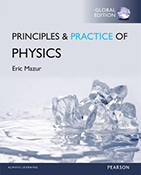Last edition Elsevier Based on his storied research and teaching, Eric Mazur’s Principles & Practice of Physics builds an understanding of physics that is both thorough and accessible. Unique organization and pedagogy allow students to develop a true conceptual understanding of physics alongside the quantitative skills needed in the course.
Last Edition
ISBN 13: 9781292078878
Imprint: Pearson Education Limited
Language: English
Authors: Eric Mazur
Pub Date: 01/2015
Pages: 2050
Illus: Illustrated
Weight: 3,400.00 grams
Size: h 216 x 277 mm
Product Type: Softcover
| List Price |
| grn 2460 |
| $ 83,39 |
| to order |
- • The separation of the Principles and Practice volumes addresses students' tendency to focus on shallow problem solving at the expense of understanding. The Principles volume teaches the physics; the Practice volume teaches the skills needed to apply physics to the task of solving problems. For example, Principles includes simple worked examples aimed at promoting understanding; Practice contains complex worked examples, problem sets, and related features.
- • The division of each Principles chapter into a Concepts section and a Quantitative Tools section helps students to build a robust understanding of the material instead of focusing too quickly on equations. The Concepts section develops the ideas in qualitative terms, using words and pictures and building from specific observations to general principles. The Quantitative Tools section formalizes the ideas mathematically.
- • Conservation laws. The conservation laws are the backbone of contemporary physics. This text develops conservation of momentum and energy before Newton's laws, and it emphasizes symmetry, conservation, and unity throughout. In mechanics, this approach avoids many of the pitfalls related to the concept of force, leads naturally to the two-body character of forces, and enables students to solve a range of problems before bringing in calculus.
- • Concept of a system. Many ideas in physics depend on distinguishing system from surroundings, and selecting an appropriate system is a key skill for solving many types of problems. This text uses the idea of a system explicitly and consistently.
- Eric Mazur is the Balkanski Professor of Physics and Applied Physics at Harvard University and Area Dean of Applied Physics. As an internationally recognized scientist and researcher, he leads a vigorous research program in optical physics and supervises one of the largest research groups in the Physics Department at Harvard University. Eric Mazur is author or co-author of over 250 scientific publications and holds two dozen patents. He has also written on education and is the author of Peer Instruction: A User's Manual (Prentice Hall, 1997), a book that explains how to teach large lecture classes interactively. In 2006, he helped produce the award-winning DVD Interactive Teaching. He is the founder of Learning Catalytics, a platform for promoting interactive learning in the classroom, which is available in MasteringPhysics(R).
- 1. Foundations
- 2. Motion in One Dimension
- 3. Acceleration
- 4. Momentum
- 5. Energy
- 6. Principle of Relativity
- 7. Interactions
- 8. Force
- 9. Work
- 10. Motion in a Plane
- 11. Motion in a Circle
- 12. Torque
- 13. Gravity
- 14. Special Relativity
- 15. Periodic Motion
- 16. Waves in One Dimension
- 17. Waves in Two and Three Dimensions
- 18. Fluids
- 19. Entropy
- 20. Energy Transferred Thermally
- 21. Degradation of Energy
- 22. Electric Interactions
- 23. The Electric Field
- 24. Gauss's Law
- 25. Work and Energy in Electrostatics
- 26. Charge Separation and Storage
- 27. Magnetic Interactions
- 28. Magnetic Fields of Charged Particles in Motion
- 29. Changing Magnetic Fields
- 30. Changing Electric Fields
- 31. Electric Circuits
- 32. Electronics
- 33. Optics
- 34. Wave and Particle Optics
- To order a book, you need to send a phone number for a callback. Then specify:
- 1. Correct spelling of the first name, last name, as indicated in the passport or other document proving the identity. (Data is required upon receipt of the order)
- 2. City of delivery
- 3. Nova Poshta office number or desired delivery address.
- The prices on the site do not include the cost of Nova Poshta services.
- When prepaying for the Master Card, the supplier pays the order forwarding.
- Delivery is carried out anywhere in Ukraine.
- Delivery time 1-2 days, if the book is available and 3-4 weeks, if it is necessary to order from the publisher.




